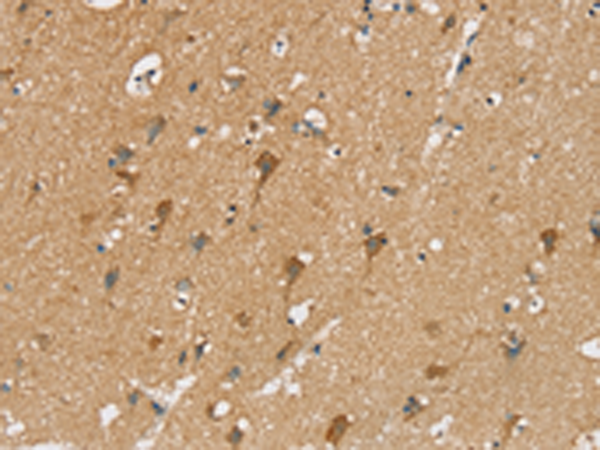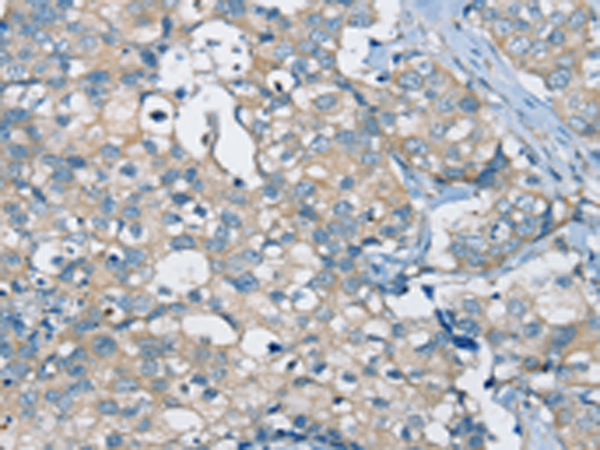

| WB | 咨询技术 | Human,Mouse,Rat |
| IF | 咨询技术 | Human,Mouse,Rat |
| IHC | 1/10-1/50 | Human,Mouse,Rat |
| ICC | 技术咨询 | Human,Mouse,Rat |
| FCM | 咨询技术 | Human,Mouse,Rat |
| Elisa | 1/1000-1/2000 | Human,Mouse,Rat |
| Aliases | hSiah2 |
| Host/Isotype | Rabbit IgG |
| Antibody Type | Primary antibody |
| Storage | Store at 4°C short term. Aliquot and store at -20°C long term. Avoid freeze/thaw cycles. |
| Species Reactivity | Human, Mouse, Rat |
| Immunogen | Synthetic peptide of human SIAH2 |
| Formulation | Purified antibody in PBS with 0.05% sodium azide and 50% glycerol. |
+ +
以下是3篇关于SIAH2抗体的文献摘要及作者信息,供参考:
---
1. **文献名称**: *SIAH2 regulates HIF-1α-mediated glycolysis through ubiquitination of PKM2 in pancreatic cancer*
**作者**: Yang W, et al.
**摘要**: 本研究利用SIAH2抗体进行免疫沉淀和Western blot分析,发现SIAH2通过泛素化PKM2调控HIF-1α依赖的糖酵解途径,促进胰腺癌细胞的增殖和转移。该机制为靶向肿瘤代谢提供新思路。
---
2. **文献名称**: *SIAH2 is a critical mediator of oxidative stress-induced apoptosis in cancer cells*
**作者**: Kim H, et al.
**摘要**: 通过SIAH2抗体的免疫组化实验,研究发现SIAH2在氧化应激下通过降解抗凋亡蛋白促进癌细胞凋亡,其表达水平与肿瘤患者预后显著相关,提示SIAH2可作为治疗靶点。
---
3. **文献名称**: *Proteomic identification of SIAH2 substrates reveals its role in mitochondrial dynamics*
**作者**: Li X, et al.
**摘要**: 利用SIAH2抗体结合质谱分析,鉴定了多个线粒体动态相关蛋白为SIAH2的泛素化底物,揭示了SIAH2通过调控线粒体分裂影响癌细胞存活和化疗耐药性的分子机制。
---
4. **文献名称**: *Targeting SIAH2 ubiquitin ligase for overcoming BRAF inhibitor resistance in melanoma*
**作者**: Schmidt RL, et al.
**摘要**: 研究通过SIAH2抗体检测临床样本,发现SIAH2高表达与黑色素瘤患者BRAF抑制剂耐药相关,抑制SIAH2可恢复药物敏感性,为联合治疗策略提供实验依据。
---
以上文献均聚焦于SIAH2在肿瘤中的功能机制及抗体应用,涵盖代谢调控、凋亡、线粒体动态和耐药性等方向。
The SIAH2 (Seven In Absentia Homolog 2) antibody is a crucial tool for studying the SIAH2 protein, an E3 ubiquitin ligase involved in the ubiquitin-proteasome system. SIAH2 plays a key role in regulating cellular processes such as apoptosis, hypoxia response, and tumorigenesis by targeting substrates like PHD3. AKT, and β-catenin for proteasomal degradation. Its activity is often upregulated in cancers, making it a focus in oncology research.
SIAH2 antibodies are designed to detect and quantify endogenous SIAH2 protein levels in various experimental settings, including Western blotting, immunohistochemistry (IHC), immunofluorescence (IF), and flow cytometry. These antibodies are typically produced in hosts like rabbits or mice, with monoclonal variants offering high specificity and polyclonal versions providing broader epitope recognition. Validation parameters, such as reactivity across species (human, mouse, rat) and application-specific optimization, ensure reliability in diverse research models.
Researchers use SIAH2 antibodies to explore its role in cancer progression, metabolic reprogramming, and therapeutic resistance. Dysregulation of SIAH2 is linked to tumor growth, metastasis, and poor prognosis, making it a potential biomarker or therapeutic target. Recent studies also investigate its interplay with hypoxia-inducible factors (HIFs) and oncogenic signaling pathways. As interest in ubiquitin-mediated regulation grows, SIAH2 antibodies remain essential for unraveling its multifaceted biological and pathological functions.
×